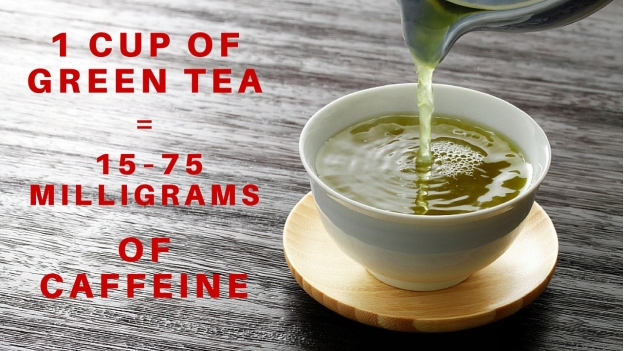 For the health-conscious, it’s natural to ask how if green tea has caffeine, or does green tea have calories, or make other inquiries about the contents of green tea in general.
For the health-conscious, it’s natural to ask how if green tea has caffeine, or does green tea have calories, or make other inquiries about the contents of green tea in general.
After all, despite the many purported benefits of green tea, caffeine can still pose an issue if you suffer from hypertension or are otherwise susceptible to the effects of a stimulant.
Although the question of “does green tea have caffeine” can be a straight yes or no answer, such a response is also a gross simplification of the underlying concern.
The issue is not whether green tea has any caffeine in it, but rather how significant an effect the caffeine, if any, can have compared to the other contents in the tea.
What Is Caffeine?
Caffeine is an inherently bitter chemical that is one of the various end products that arise when certain plants metabolize nitrogen. In the plants, caffeine works as a natural pesticide and can paralyze and/or kill preying insects.
In people, caffeine belongs to a family of drugs that stimulate the central nervous system. Caffeine is used both as a food additive, where it gets added to everything from waffles to sunflower seeds, and as a drug, where it can be taken directly as a stimulant. Most people get at least some of their caffeine from drinks in the form of coffee or tea.
Does Green Tea Have Caffeine?
Yes, green tea does contain caffeine. In fact, almost all teas contain caffeine. This is because things like black, green, or white tea all originate from the same plant: the Camellia sinensis. It’s only which part of the plant that the leaf is picked from, and how it’s processed afterwards, that dictates what kind of tea results and the final caffeine content. In other words, unless you get it decaffeinated, green tea and any other type of tea is going to have caffeine.
How Much Caffeine is in Green Tea?
Generally speaking, green tea inherently contains more caffeine than the average cup of coffee. However, unless you are eating the leaves raw, you aren’t going to be ingesting the full amount.
The process of steeping the tea, whether it’s taken as a suspension or infusion, and the specific type of green tea are all going to affect how much caffeine you get per cup. The amount of caffeine can therefore be as low as 15 milligrams per cup all the way up to 75 milligrams per cup and sometimes even higher. For comparison, the average cup of coffee has about 95 milligrams of caffeine.

What Else Is in Green Tea?
There are around 450 known organic compounds in green tea but, nutritionally speaking, no one pays attention to most of them.
The big names in green tea contents are various antioxidants in the form of catechin polyphenols, theanine (flavonoid), vitamins C, B2, E, folic acid, beta carotene, saponins, fluorine, and various minerals such as potassium, calcium, and phosphorus in small amounts.
The amount of any one of these is going to vary based on the type of green tea you drink and how it’s prepared, but the point is that there’s more to the tea than just caffeine.
| Compound | Benefit |
|---|---|
| Catechins | Lowers LDL cholesterol, reduces body fat, antioxidant activity, may inhibit high blood pressure (but not lower it), anti-hyperglycemic properties, deodorizing |
| Theanine | Neural cell protector, lowers blood pressure, promotes alpha wave production in the brain (relaxes) |
| Vitamin C | Maintains healthy skin and mucus membranes, collagen production (skin firmness, etc.), antioxidant properties |
| Vitamin B2 | Helps maintain healthy skin and mucus membranes |
| Vitamin E | Antioxidant properties targeted at fats |
| Folic Acid | Helps avoid fetal neural tube defects and mitigates arterial sclerosis |
| Beta Carotene | Used to produce vitamin A, which in turn promotes night vision |
| Saponins | Anti-fungal, anti-inflammatory, and anti-allergy properties, lowers blood pressure, helps combat flu virus |
| Fluorine | Helps form outer layer on the teeth for cavity protection |
| Minerals | Regulates various biological systems |
Which Teas Have Caffeine and Which Are Completely Caffeine-Free?
The answer to the first part is “almost all” and the answer to the second part is “almost none.” Although decaffeinated green tea and other tea types exists, these aren’t caffeine-free. A cup of decaf tea can still have up to 12 milligrams of caffeine depending on factors like how the leaves were processed and how the caffeine was extracted, along with how the tea drink gets made and treated.
Having said that, it’s possible to get completely caffeine-free tea if you are more flexible about what you consider “tea.” Fruit, herbal, and rooibos (from the legume family) teas do not contain any tea leaves or come from other plants that produce caffeine. Therefore, while not “true” tea, these drinks would be about as caffeine-free as you can get from steeping something in hot water.
To summarize: green tea is caffeinated, it’s tricky to get green tea without any caffeine, but it is possible to have caffeine-free tea if you aren’t picky about your definitions.

Desire caffeine-free tea? Try fruit, herbal, and rooibos teas
How to Reduce the Caffeine Content of Green Tea
Although completely caffeine-free green tea is not always possible, there are various steps that can be taken to make sure that the tea you are enjoying has a low amount of caffeine.
- Shade-grown tea plants respond to sunlight by increasing production of various chemicals, including caffeine. Opt for non shade-grown teas to avoid this.
- Caffeine is found in the largest amounts in the tea leaves, so teas made with the twigs and stems of the plant would contain lower levels.
- Powdered teas are a suspension, not an infusion. This means that the actual leaf gets into the drink as opposed to being used to infuse the water. Avoid powdered teas to get less caffeine.
- Teabags tend to have higher caffeine levels than loose-leaf tea, so opt for the loose-leaf.
- When making your tea, using simmering water instead of boiling, and brew for only 30 seconds or so; this will minimize the amount of caffeine that gets released.
- Blend green tea with other (non-caffeinated) herbs. This adds new flavors and also reduces the amount of caffeine proportionally.
- Drink decaf tea. Although the caffeine won’t be completely gone, it will certainly be much lower than normal.
Possible Side Effects of Caffeine
If something is capable of causing an effect in the body, then it is also capable of causing a negative effect as well. Caffeine is no exception and there is extensive documentation available about the side effects its consumption can have.
It’s worth noting, however, that caffeine is considered safe if your daily intake is 0 to 400 milligrams, questionable but maybe still safe between 400 to 600 milligrams, and definitely inadvisable at 600 milligrams or greater.
If you are only getting one to five cups of green tea per day, you aren’t likely to be running into this last level. If you drink more, particularly if you go for the green tea blends that are highest in caffeine, you may start seeing issues.
Excessive caffeine can cause the following health problems:
- Aggravating any pre-existing sleep disorders or anxiety issues
- Headache
- Heartburn
- Excess urination
- Aggravating acid reflux or ulcers
- Interfering with calcium absorption or metabolism
- Short-term blood pressure spike (worse if already hypertensive)
- Difficulty conceiving
- Higher risk of miscarriage
- Rapid heartbeat
- Rapid breathing
- Nausea and/or vomiting
- Jitters (especially if unused to large levels)
In extremely large amounts, caffeine can also cause seizures, coma, or death. The sheer level of caffeine needed to trigger these effects, however, is almost impossible to receive from green tea. Well before you have consumed enough to be fatal, the vomiting would make further ingestion impossible. This is why almost every known case of death from caffeine poisoning has been due to overdosing on caffeine pills.
A Word about Supplements
All of the above only applies to green tea drinks. Supplements are a different matter and have a set of other concerns attached to them. A green tea supplement would contain much more caffeine than you would get from a cup of tea, even if the amount of plant is the same (and it will usually be much higher).
Additionally, supplements also have higher concentrations of the other compounds that make up green tea. This is a problem since the polyphenols in green tea extracts may cause liver failure in a small number of cases, and the health value in taking green tea supplements in general is mixed and unclear at best.
In fact, green tea is not considered “effective” for any condition and only “likely effective” for providing mental alertness and for treating hyperlipidemia and, for some reason, genital warts.
What All This Means for You
Does green tea have caffeine? Yes, yes it does. Does it have enough that you should be worried? Probably not and even if you’re worried there are a number of different methods available that can be used to lower the amount of caffeine you end up with.
Approaches ranging from switching to decaf blends to using twigs to spending less time brewing to opting out of tea leaves altogether can all be employed. Unless you are hypertensive, aim for the strongest types of green tea, and drink multiple cups every day, the amount of caffeine in your tea isn’t likely to produce any long-term issues either, even without decaffeination methods.
Supplements are a bit of a different story and green tea supplements can have enough caffeine either on their own or due to adulteration to create problems if over-used (not counting the liver failure issue). The net takeaway from all this is that if you’re concerned about your caffeine from green tea, don’t drink more than three to four cups, avoid supplements, and stick to decaf and you’ll be fine.
Read Next:
Sources for Today’s Article:
“Caffeine Content for Coffee, Tea, Soda and More,” Mayo Clinic web site, last updated May 13, 2014; http://www.mayoclinic.org/healthy-lifestyle/nutrition-and-healthy-eating/in-depth/caffeine/art-20049372, last accessed April 18, 2016.
Pietrangelo, A., “The Effects of Caffeine on the Body,” Healthline web site, last reviewed October 22, 2014; http://www.healthline.com/health/caffeine-effects-on-body, last accessed April 18, 2016.
